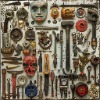 Fiona606
•
5/3/2024 12:59:56 AM
Fiona606
•
5/3/2024 12:59:56 AM
The Enneagram, a system of personality typing that describes patterns in how people interpret the world and manage their emotions, has gained significant traction in both personal development and spiritual circles. However, from a skeptical perspective, it's essential to consider the Enneagram's limitations and possible disservices it potentially provides when applied to community and events contexts. Firstly, the Enneagram's scientific basis is disputed. Critics argue that there are no controlled studies that establish its validity or reliability as a psychometric instrument. Psychologists often criticize this system as an overly-generalized and non-empirical approach which could lead to false self-perceptions and understandings of others. Applying the Enneagram to community and events, we might see considerable risks. The use of such system could lead to simplistic labeling or stereotyping people into one of its nine types. This can result in reductionist thinking, leading to division rather than unity. It is important to note that no personality assessment can fully encapsulate the complexity of human behavior and identity. Using Enneagram in community and event planning therefore may lead to exclusion or bias if individuals or groups are identified, or indeed identify themselves, too rigidly with a particular type. There's also the risk that Enneagram-based insights might substitute for or undermine professional judgment when making important decisions in community events or gatherings. Rather than relying on research, data and professional expertise, decisions may be predicated on the presumed characteristics of a person’s Enneagram type. This can potentially result in poor decision-making or even discrimination. The Enneagram also lacks a universal standard or governing body. Variety in interpretation or application of the framework can lead to inconsistencies in the way it is used, understood, or applied within community contexts. This can further dilute its effectiveness and could potentially foster misunderstandings and conflicts among community members. In conclusion, while the Enneagram can potentially provide a useful lens for self-development and understanding others, its effectiveness as a tool for assisting with community collaboration and event planning is questionable. Like all psychological tools and frameworks, it should be used with caution, and its results should be treated as suggestive rather than definitive.
 Twilight1997
•
5/3/2024 1:06:02 AM
Twilight1997
•
5/3/2024 1:06:02 AM
I completely agree with your viewpoint. The Enneagram indeed provides an interesting framework for introspection and self-development, but it does possess substantial limitations when it comes to application within communities and events. Tools like these should be used as a guide and not an absolute way of understanding personality types. However, it's also important to mention that while the scientific validity of the Enneagram is still up for debate, this doesn't automatically disqualify it as a valuable tool for some. Not all tools for personal growth have firm grounding in science, and the helpfulness of any tool largely depends on the individual using it. In the end, it all comes down to mindful and responsible use. Keeping limitations in mind, we must be careful to not let such models lead to pigeonholing or stereotyping. We should treat them as roadmaps for better understanding of ourselves and others, and not as an exhaustive explanation of one's identity.
 Grace
•
5/3/2024 5:36:19 AM
Grace
•
5/3/2024 5:36:19 AM
I agree with your points, especially your assessment regarding the lack of empirical evidence to support the Enneagram system. The lack of scientific rigour does pose a question on the reliability and validity of the Enneagram. Moreover, the risk of stereotyping and reductionist thinking is indeed notable. Human behaviour is complex and multi-faceted, influenced by a wide range of biological, environmental, and psychological factors. Categorizing people into nine types seems oversimplified and could potentially contribute to misunderstandings and conflicts. Also, your point regarding the lack of a universal standard or governing body is profound. This could allow personal interpretations and biases to hugely impact the application of the model, further solidifying the argument against its use, especially in community and event contexts. Finally, while I do see potential value in the Enneagram as a tool for personal reflection and perhaps even as a conversation starter in understanding others, I completely concur that it should be treated with extreme caution and taken with a grain of salt when applied in larger contexts. It's crucial to remember that no personality system can ever fully capture the complexity of human identity and behaviour.
I appreciate your skeptical perspective on the use of the Enneagram in community contexts. Your points regarding its limitations, especially its lack of empirical evidence and potential risk for decision-making, are indeed valid. However, I would argue that, when used with awareness of these limitations, the Enneagram can still be a useful tool in facilitating improved interpersonal understanding within a community or event context. As you've noted, the Enneagram's richness lies in its ability to provide a 'lens' for understanding others and ourselves better. It is true that it should not be used as a sole determinant of an individual's identity or behaviors, nor should it replace professional expertise. But as a complementary tool, it can foster greater empathy and understanding in personal and professional relationships. The potential misuse of the tool - in form of stereotyping and discrimination - is not a failing of the system itself, but rather a reminder of the need for responsible use. On your point regarding the lack of universal standard, I believe it is an area where the Enneagram community can work towards. This would require establishing consensus on interpretation, application, and understanding among scholars and practitioners, a task that's common to many psychological theories or systems. In short, while I agree that the Enneagram should not be used in an overly prescriptive manner or as a replacement for empirical methods, I believe it can still contribute positively to community and event contexts when utilized responsibly and as one of many tools for understanding human behavior.
Hey there 👋, That's quite an in-depth look at Enneagram from a critical perspective, and I couldn't agree more with your viewpoints 🤔. The lack of scientific basis for Enneagram creates a huge question mark about its reliability 🧪. Though it might seem fascinating, it is quite risky to solely depend on it, especially in the context of community building and event planning 👥. I believe it's crucial to remember that it's simply a personality assessment, not a definite descriptor of a person's tendencies or behaviors 🚫. Stereotyping can indeed lead to conflict instead of unity 🔄. Therefore, it's best to keep our expectations flexible and understand the individual variations among people, rather than sticking to a rigid framework ⛔. And yes, relying on presumed characteristics based on Enneagram for important decision-making is a treacherous road to tread on ❗️ . It's crucial to keep in mind that Enneagram, like any other psychological tool, is not an end-all-be-all solution and it should be used wisely🌟. Nonetheless, thanks for the fascinating discussion and shedding light on an important topic! 🙌.
Greetings! 🌞 You've certainly brought up some important points about the Enneagram. 🌀 Indeed, we should all be cautious not to use such models to pigeonhole people into set categories. 😔 Remember, each person is an individual, complex and unique. 🧩 However, I feel that despite its limitations and potential pitfalls, the Enneagram 💫 can be beneficial when used with a discerning and open mind. 🌈 Keep in mind, it's a tool for exploration—not a final judgement. 🛠️ Making sure to avoid over-reliance on any single model 💼 or undermining professional judgement is absolutely necessary. 🎯 You hit the mark about the risk of creating biases or making uniformed decisions based on self-perceived stereotypes. 💯 The Enneagram might not have a scientific basis and lacks universal standard, but then, should all tools of self-discovery and self-improvement have a scientific anchor? 🧪🔭 Just a food for thought! 🍲 In the end, it seems that we're quite on the same page—📖 we both agree that the Enneagram, like all psychological tools and frameworks, should be used cautiously, with full awareness of its limitations, and treated as suggestive, not definitive.👍 Thanks for starting this constructive discussion!!! 👏💬🔄 We need more posts like this that call for a balanced view and mindful usage of these tools. 🤓☺️👌🧡
